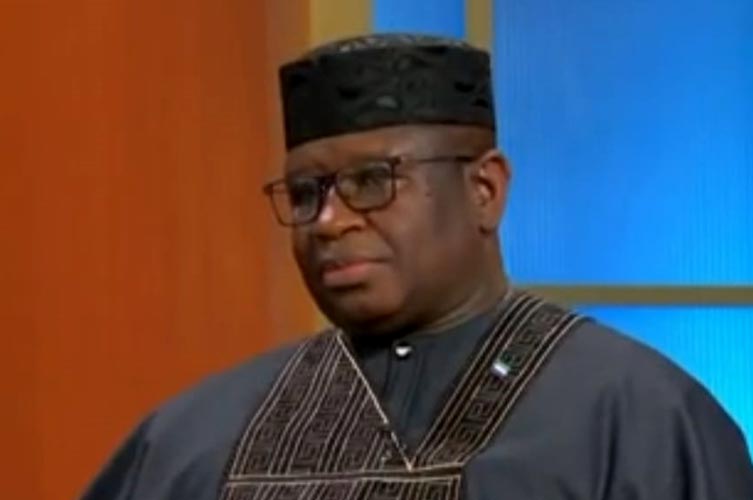Cairo, Egypt: Sunday 8 September 2024
Since taking office in April 2018, President Dr. Julius Maada Bio has made notable contributions to the international stage, positioning Sierra Leone as a nation committed to development, democracy, and human rights. Through strategic diplomatic engagement and participation in global discussions, the president has sought to enhance Sierra Leone’s international standing and attract investment and support for national development.
Strengthening Diplomatic Tie: One of President Bio’s key contributions has been the revitalization of Sierra Leone’s diplomatic relationships. By engaging with various countries and international organizations, he has fostered partnerships that are vital for development. The Bio administration has prioritized building relationships with the African Union (AU), the United Nations (UN), and the Economic Community of West African States (ECOWAS).
These relationships open avenues for Sierra Leone to participate in discussions on regional security, trade, and sustainable development. Notably, President Bio’s active role in the AU has allowed Sierra Leone to contribute to significant regional dialogues concerning peace building and conflict resolution, securing a voice for the nation on critical issues affecting West Africa.
Climate Change and Environmental Advocacy: President Bio has positioned Sierra Leone as a proactive participant in climate change discussions, aligning with global calls for environmental protection. His government has committed to ambitious climate action plans, making Sierra Leone one of the first nations in the region to address issues related to climate resilience and sustainability on such a significant level.
This international advocacy on climate issues not only addresses environmental concerns but also seeks to attract foreign investment in sustainable projects. As global attention on climate change intensifies, Sierra Leone stands to benefit from partnerships and funding aimed at climate resilience, providing opportunities for economic growth and job creation in the green economy.
Investment in Human Capital: Another cornerstone of President Bio’s international contributions is his focus on education, health, and human capital development. By championing initiatives like the Free Quality Education program, he has sought recognition and support from international development partners. This commitment aims to enhance the quality of education and increase access for all Sierra Leoneans.
In the long term, an educated and skilled workforce will be essential for Sierra Leone’s economic growth and stability. International partnerships, such as those with UNESCO and other agencies, have the potential to bolster educational standards, enabling Sierra Leone to compete globally in various sectors.
Promoting Democracy and Good Governance: President Bio’s emphasis on democratic principles and good governance has also resonated on the international stage. His administration has undertaken steps to promote transparency, accountability, and human rights, which aligns with the values of many international partners. The support from entities like the Commonwealth and various NGOs reflects the importance of these principles in enhancing Sierra Leone’s global image.
By promoting democracy, Sierra Leone can attract international investment and support, as investors and stakeholders often seek stable environments with respect for human rights and the rule of law. This foundation can lead to economic growth, fostering an environment conducive to foreign direct investment (FDI).
The contributions made by President Bio on the international stage have far-reaching implications for Sierra Leone, both now and looking ahead.
Economic Growth: Improved international relations and investments can drive economic growth, create jobs, and enhance local industries. An influx of FDI, particularly in sectors like agriculture, mining, and renewable energy, can stimulate the economy.
Increased International Aid: Strengthened diplomatic ties may lead to increased development aid and technical assistance from international organizations and friendly nations. These resources can support critical sectors such as health infrastructure and public services.
Enhanced Education and Skills Development: Global partnerships can lead to improved educational frameworks and vocational training, equipping the youth with necessary skills for the job market, thus addressing unemployment issues.
Sustainable Development: By focusing on climate change and environmental sustainability, Sierra Leone can ensure that its development is resilient and responsible, safeguarding resources for future generations while meeting current needs.
Regional Stability: Active participation in regional organizations can enhance Sierra Leone’s influence in promoting peace and stability in West Africa. This stability is vital for long-term economic growth and social cohesion.
In conclusion, President Julius Maada Bio’s contributions to the international stage have initiated a positive trajectory for Sierra Leone. His emphasis on diplomacy, education, good governance, and environmental sustainability sets the groundwork for future growth and stability. As Sierra Leone continues to engage with the global community, the potential benefits can lead to a more prosperous and equitable society, ensuring that the nation harnesses its resources and opportunities for the betterment of all its citizens.




